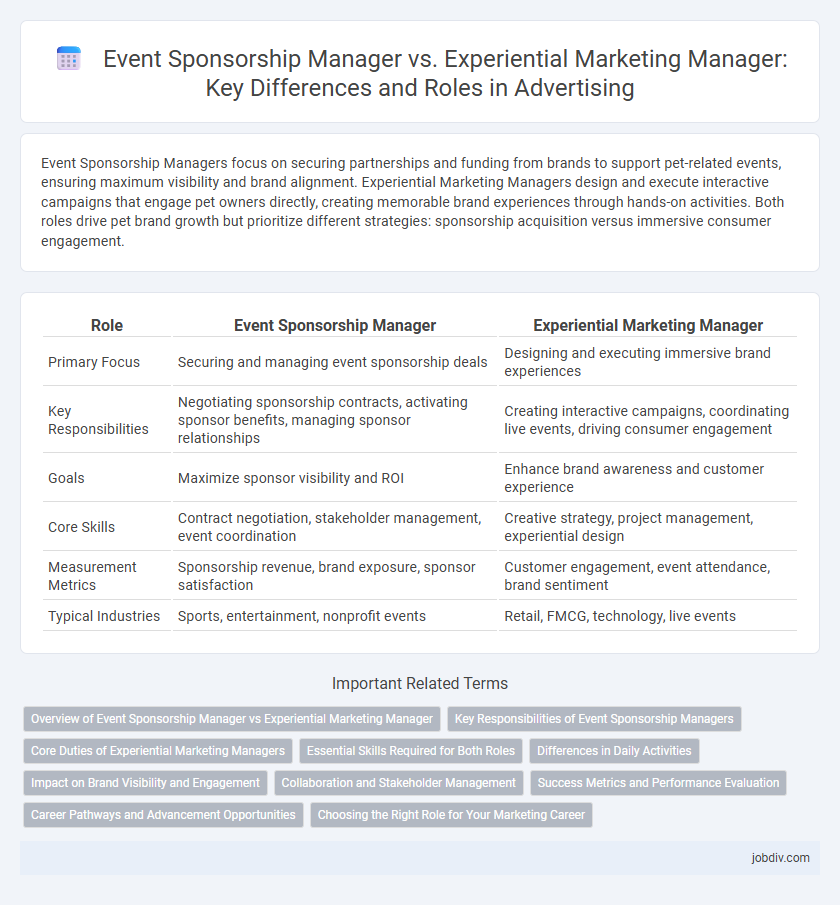Event Sponsorship Managers focus on securing partnerships and funding from brands to support pet-related events, ensuring maximum visibility and brand alignment. Experiential Marketing Managers design and execute interactive campaigns that engage pet owners directly, creating memorable brand experiences through hands-on activities. Both roles drive pet brand growth but prioritize different strategies: sponsorship acquisition versus immersive consumer engagement.
Table of Comparison
| Role | Event Sponsorship Manager | Experiential Marketing Manager |
|---|---|---|
| Primary Focus | Securing and managing event sponsorship deals | Designing and executing immersive brand experiences |
| Key Responsibilities | Negotiating sponsorship contracts, activating sponsor benefits, managing sponsor relationships | Creating interactive campaigns, coordinating live events, driving consumer engagement |
| Goals | Maximize sponsor visibility and ROI | Enhance brand awareness and customer experience |
| Core Skills | Contract negotiation, stakeholder management, event coordination | Creative strategy, project management, experiential design |
| Measurement Metrics | Sponsorship revenue, brand exposure, sponsor satisfaction | Customer engagement, event attendance, brand sentiment |
| Typical Industries | Sports, entertainment, nonprofit events | Retail, FMCG, technology, live events |
Overview of Event Sponsorship Manager vs Experiential Marketing Manager
Event Sponsorship Managers specialize in securing and managing partnerships to fund and promote events, focusing on brand alignment and maximizing sponsor visibility. Experiential Marketing Managers design immersive brand experiences that engage consumers directly, fostering emotional connections and driving brand loyalty through interactive activations. Both roles require strategic planning and collaboration but differ in emphasis: sponsorship centers on partnership leverage, while experiential marketing prioritizes consumer engagement and brand experience delivery.
Key Responsibilities of Event Sponsorship Managers
Event Sponsorship Managers oversee securing and managing brand partnerships for events, ensuring alignment with marketing goals and maximizing sponsor visibility. They develop sponsorship proposals, negotiate contracts, and coordinate activation strategies to engage target audiences effectively. Their role includes monitoring sponsor deliverables and analyzing campaign performance to optimize return on investment.
Core Duties of Experiential Marketing Managers
Experiential Marketing Managers design and execute immersive brand experiences that engage consumers through sensory and interactive elements, driving emotional connections and brand loyalty. They oversee event activations, coordinate with creative teams, and analyze campaign performance to optimize audience engagement. Their role involves managing logistics, partnerships, and on-site staff to ensure seamless execution of live marketing events.
Essential Skills Required for Both Roles
Event Sponsorship Managers must excel in relationship-building, negotiation, and contract management to secure and maintain valuable brand partnerships, while also possessing strong project management skills to coordinate sponsorship activations. Experiential Marketing Managers require creativity, consumer engagement expertise, and the ability to design immersive brand experiences that drive emotional connections and measurable ROI. Both roles demand strategic thinking, excellent communication, and data analysis capabilities to align campaigns with business objectives and optimize event impact.
Differences in Daily Activities
An Event Sponsorship Manager primarily focuses on identifying, negotiating, and managing partnerships with brands to secure funding and visibility for events, ensuring sponsor goals align with event objectives. In contrast, an Experiential Marketing Manager designs and executes immersive brand experiences that engage consumers directly, emphasizing creativity and on-site activation. While the Sponsorship Manager handles contract logistics and relationship management, the Experiential Marketing Manager oversees event production, attendee interaction, and brand storytelling.
Impact on Brand Visibility and Engagement
Event Sponsorship Managers secure strategic partnerships that enhance brand visibility through high-profile event associations, driving broad audience awareness. Experiential Marketing Managers create immersive brand experiences that foster deeper consumer engagement and emotional connections, increasing brand loyalty. Both roles synergistically amplify brand recognition by combining mass exposure with interactive, memorable brand interactions.
Collaboration and Stakeholder Management
Event Sponsorship Managers drive collaboration by coordinating with brands, vendors, and internal teams to secure and activate sponsorships that maximize event ROI. Experiential Marketing Managers manage stakeholders by designing immersive brand experiences that engage consumers and align with marketing objectives, ensuring cross-functional alignment between creative, sales, and operations teams. Both roles require strategic communication and relationship management to deliver cohesive campaigns that strengthen brand presence and stakeholder value.
Success Metrics and Performance Evaluation
Event Sponsorship Managers measure success through metrics such as sponsor acquisition rates, contract renewals, brand visibility, and return on investment (ROI) tied to sponsored events. Experiential Marketing Managers evaluate performance by tracking engagement levels, attendee participation, social media interactions, and qualitative feedback reflecting brand experience impact. Both roles prioritize data-driven analytics to optimize campaign effectiveness and align marketing objectives with business growth.
Career Pathways and Advancement Opportunities
Event Sponsorship Managers typically advance by developing expertise in corporate partnerships and strategic relationship management, often progressing into senior roles such as Sponsorship Director or Brand Partnership Lead. Experiential Marketing Managers focus on designing immersive brand experiences, with career growth leading to positions like Experiential Marketing Director or Head of Brand Activation. Both pathways offer opportunities in marketing leadership, but Event Sponsorship emphasizes negotiation and client relations, while Experiential Marketing centers on creative campaign execution and consumer engagement.
Choosing the Right Role for Your Marketing Career
Event Sponsorship Managers specialize in securing and managing partnerships that elevate brand visibility through strategic event alignments, driving ROI by leveraging influencer and corporate collaborations. Experiential Marketing Managers design immersive brand experiences that engage consumers directly, using innovative tactics like pop-up activations, VR integrations, and live event storytelling to enhance customer connection. Selecting the right role depends on your strength in relationship management versus creative campaign execution, aligning career growth with either partnership negotiation or dynamic consumer engagement.
Event Sponsorship Manager vs Experiential Marketing Manager Infographic

 jobdiv.com
jobdiv.com